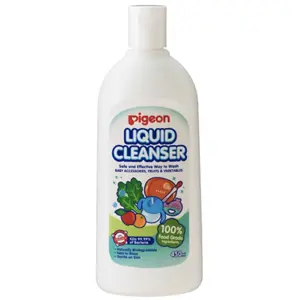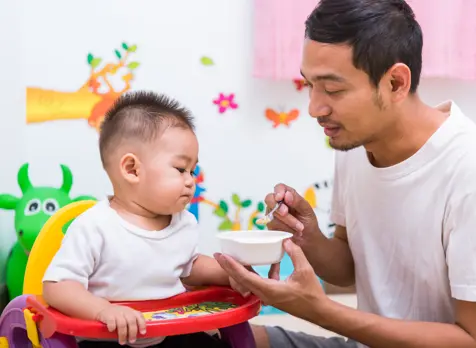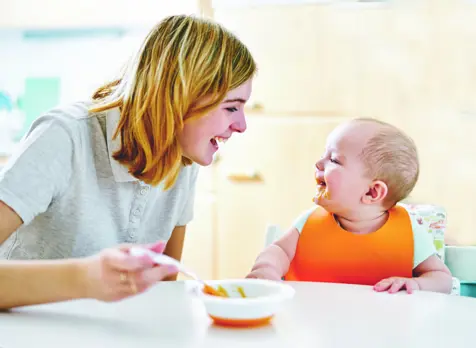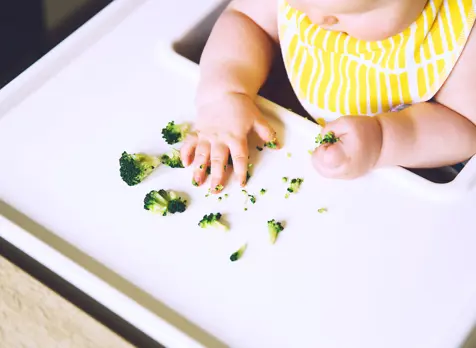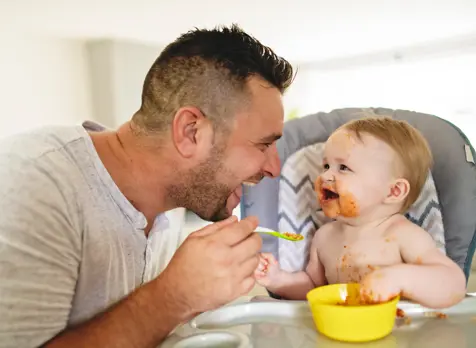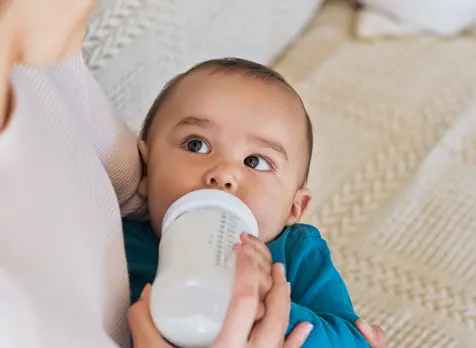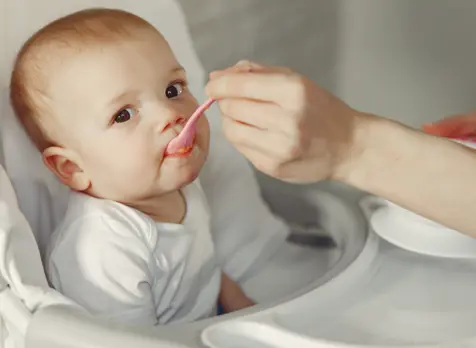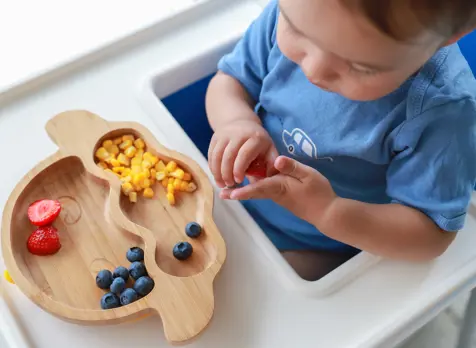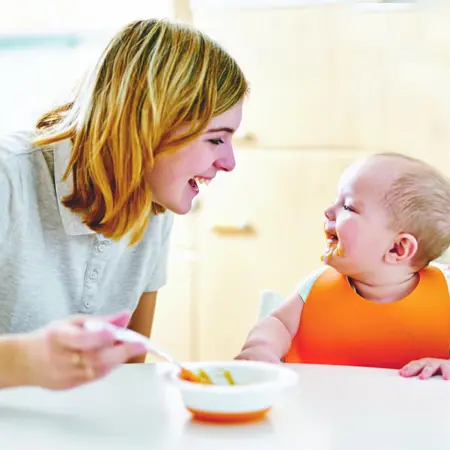Baby Feeding
6 to 8 Months

On this page
When should you start solids?
At around six months of age, your baby will become increasingly curious about food. They will be ready to try a variety of foods to complement their milk intake.
The current Australian guidelines recommend you start your baby on solid food at around six months of age. You should also continue to breastfeed or give your baby infant formula until at least 12 months old.
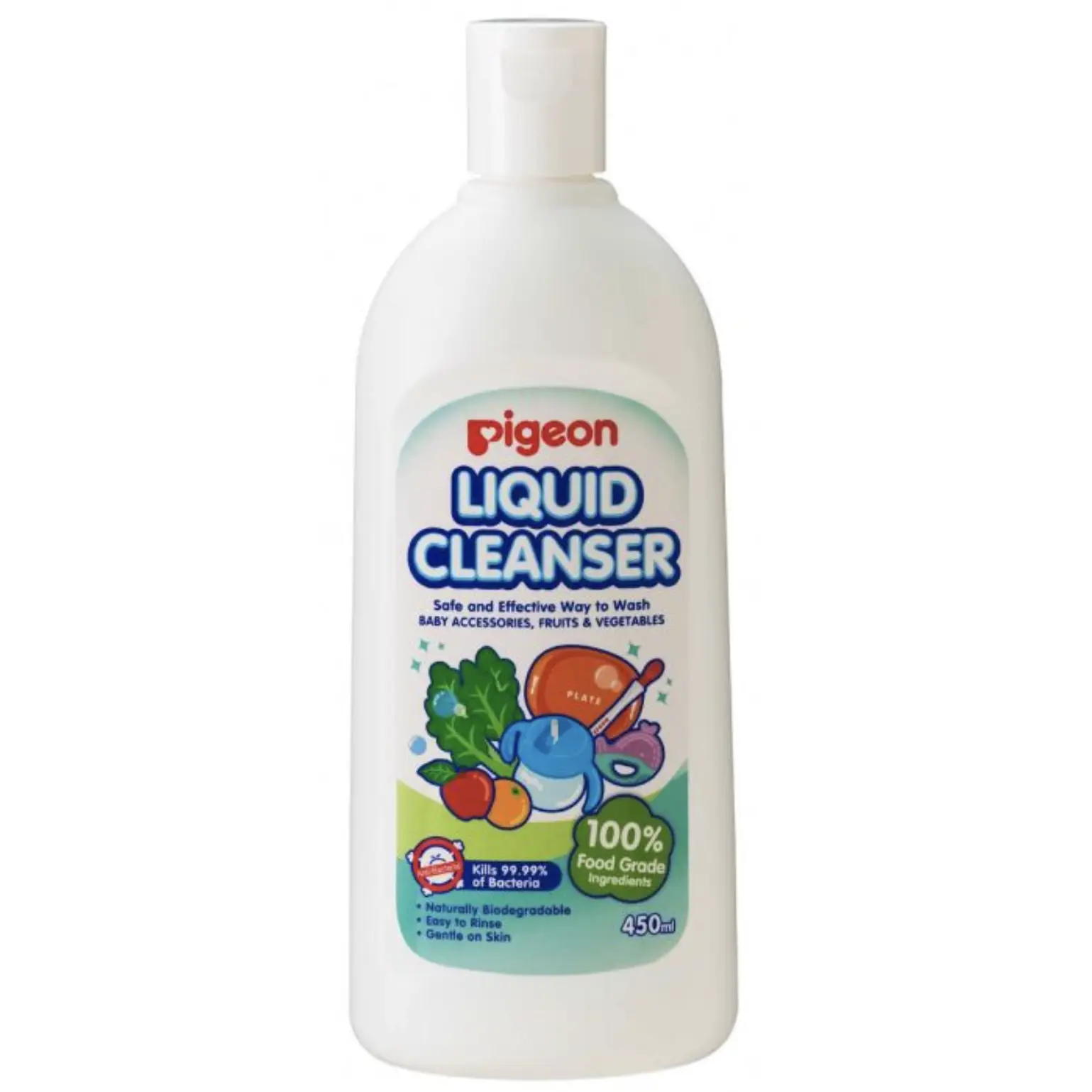
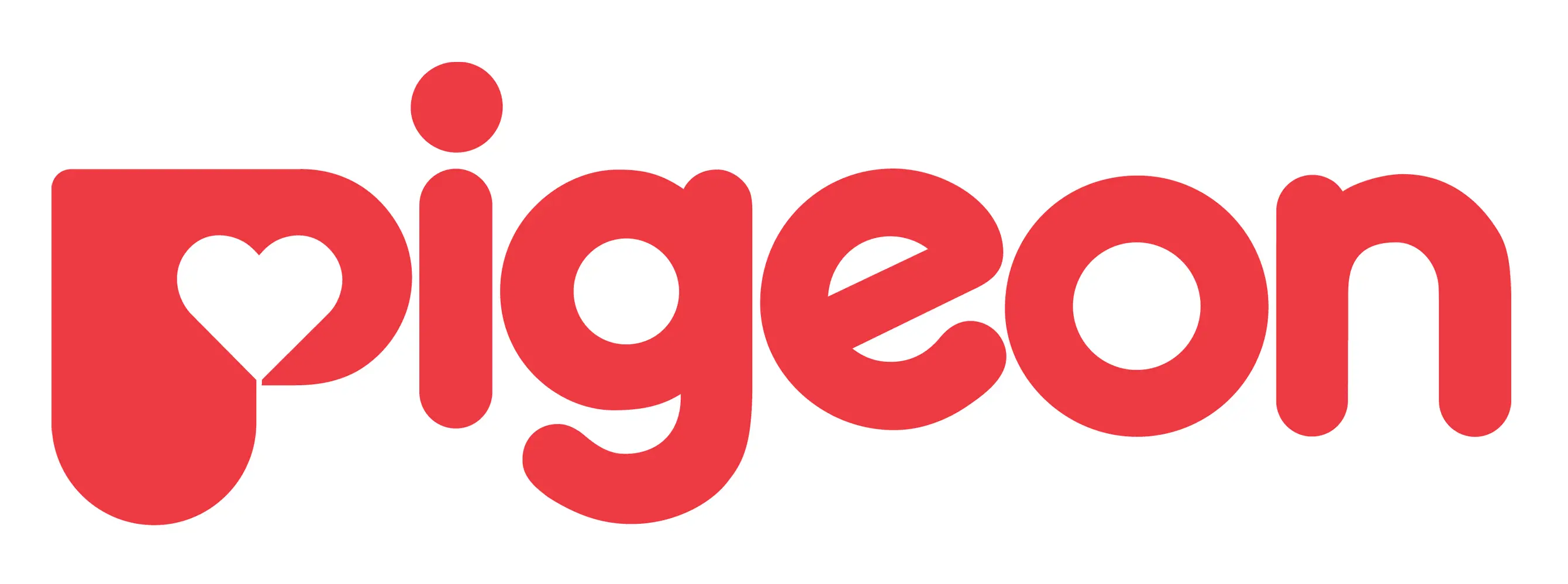
Advertisement
Pigeon Liquid Cleanser
How do you know your baby is ready for solid food?
At around six months of age, you may notice some of the following behaviours:
- Your baby can sit more upright which requires good neck, shoulder and head control.
- They're showing interest in your food which includes the food on your plate.
- They have an increased appetite. For example, they're needing more frequent breast or bottle feeds.
- Their hand-to-mouth behaviour increases including putting toys in their mouth.
- They open their mouth when you offer them food.
If they're showing these behaviours, they're ready to try solid food.
How to introduce solid food
Introducing your baby to solid food can be great fun as you share their reaction to this new experience of different textures and flavours.
At the beginning, breastmilk or infant remains the most important part of their diet and is best offered before solid food.
You may like to start with a small, unbreakable bowel and a small plastic or silicon baby spoon. Some babies like to suck the food off the spoon.
Some babies like to start with soft foods (mashed or grated) from a spoon. Others will prefer soft finger foods. Start with one meal per day.
- Start with small amounts (about 1 tablespoon. 4 teaspoons = 1 tablespoon)
- Increase each day until your baby is taking 2 tablespoons
- When taking 2 tablespoons, you can start offering your baby 2 meals a day.
- Make sure you stay with your baby during all their meals.
Be prepared for mess
Playing with food is your baby’s way of exploring new textures and learning to eat family foods
To help your baby learn to eat different tastes and textures it is important for your baby to practise by offering a variety of foods in different sizes and texture
Babies very quickly like to help feed themselves, so give them a spoon to hold from the start
What are some first foods for babies?
-
1
Mashed vegetables (eg pumpkin, potato, sweet potato, taro) and fruits (eg cooked pears/apple, ripe banana)
-
2
Well cooked rice or iron enriched rice cereal
-
3
Well cooked pureed, minced, stewed or grated meat, poultry or fish
-
4
Cook tofu or legumes such as lentils
-
5
Pasta and bread (e.g. toast fingers and rusks)
-
6
Dairy products such as full fat yoghurt, cheese and custard in small amounts
How do you progress with solid food?
At around 6 months:
- Start with one meal per day.
- As long as you include iron rich foods, first foods for babies can be introduced in any order and at a rate that suits your baby.
- Some babies are happy on one meal a day while others indicate quickly that they're ready for two. Remember to offer a breastfeed or infant formula before solid foods.
7 months:
- By this age, some babies are on two meals a day while some may be enjoying three meals.
- Continue to increase the amount and variety of foods. Allow your baby's engaging and disengaging cues during meal times guide how much you offer them to eat. Here are some baby food recipe ideas.
- The texture of the pureed food offered can now be thicker. Your baby may like to touch and explore the food.
- Continue to offer a breastfeed or infant formula before solid foods.
8-9 months
- Most babies are enjoying three meals a day.
- Continue to increase the amount, variety and texture of foods guided by your baby’s cues. e.g. fork mashed foods and steamed vegetable pieces, soft fruit pieces, strips of soft meat.
- Your baby will enjoy having their own spoon to hold at mealtimes and experiencing finger foods
- At this time, some parents choose to offer solids first then milk feed after.
What if my baby refuses solid food?
Not all babies are ready to start eating solid foods. You may need to be flexible and consider your baby's temperament. Remember, feeding in the first few months is about them learning new tastes, textures and smells, knowing how to let you know that they're ready for another mouthful or they're full. It should also be fun!
Some ways to help, you could reduce distractions (eg turn off the TV or iPad), offer food before a milk feed, make sure you're both relaxed and your baby is calm and showing signs of hunger.
Eating is a social event so it can help if your baby is participating in your family meal time. It can often take many times of looking, touching, tasting or smelling something before your baby chooses to eat it.
What about allergies?
New evidence has shown that peanut and egg should be introduced between 4 and 11 months old to help prevent food allergy. Whole nuts should not be offered until 4 years of age due to the choke risk they pose. Nut spreads on toast or satay sauce are good choices.
If allergy is a problem in your family seek advice from your child and family health nurses or doctor about baby allergies before starting solids.
TOP TIPS
- From around 6 months, you can start to offer your baby cooled, boiled water.
- Until 12 months, your baby should only receive cow’s milk mixed with family foods and in cooking. After 12 months, they can try it as a drink.
- Avoid introducing honey until 12 months (due to a risk of infant botulism), raw or runny eggs as it can contain bacteria harmful to babies, reduced fat dairy until 2 years of age.
- Avoid nutrient poor foods with high levels of saturated fat, sugar, or salt (e.g. cakes, biscuits, confectionery and potato chips).
- If possible try and feed your baby with the rest of the family. Your baby will soon learn that meal times are not just about food but also about social interaction.
Starting solids FAQs
Some baby food ideas include:
- Baby Banana Smoothie
- Broccoli and Carrot Mash
- Mini Beef Stew
- Mini Lamb Curry
- Avocado Mash
- Veggie Surprise
- Chicken with Quinoa
- Baby Macaroni
- Fish Dish
Get the full Baby Food Recipes.
Cut vegetables into small chunks or strips
Soft strips of toast
Well cooked pieces of meat, chicken or fish
Slices of boiled egg
Slices of cheese
Dip or Yoghurt to dip the finger foods into
When preparing foods for your baby food safety is important. Always wash your hands before you begin and make sure the area you're preparing in is clean.
You can also use different coloured boards for food types: one each for chopping meats, fruits and vegetables.
If you’re using a microwave oven to heat baby’s food, always stir food thoroughly before serving, and check the temperature.
While fresh, home prepared food baby food is often a tastier, fresher, more textured and economical choice, it's not always available or convenient to prepare. Commercial baby food can be a stop-gap for some busy parents. If you can, it's better to offer these types of food using a spoon rather than allowing your child to suck straight out of the pouch.
Always stay with your baby while they're eating. Use a 5 point safety harness when your baby is in a high chair or low chair to prevent your baby from moving around whilst eating.
Don’t give food in the car whilst you are driving and may not be aware, or able to stop if your child begins choking.
Avoiding giving your baby nuts, small hard foods (such as raw or undercooked pieces of hard fruit and vegetables, popcorn, rice cakes and cocktail frankfurts) and small slippery foods (such as whole grapes and whole cherry tomatoes).
Advertisement






































